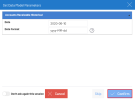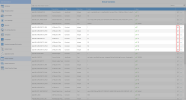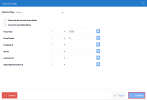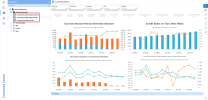Accounts Receivable
The Accounts Receivable module is composed of two cubes:
- UDM AR Historical Staging
- UDM AR Historical
The UDM AR Historical Staging cube collects all raw data related to accounts receivable (i.e. invoices, credit, payments) to create the views located in the Accounts Receivable Historical data model.
The UDM AR Historical cube takes its source from the UDM AR Historical Staging and UDM Dimtime cubes and is used to recreate the Accounts Receivable status for each of the fiscal periods. The views located in the Accounts Receivable by Period data model are created from this cube.
Tables that are used in the Accounts Receivable data models are listed in this file if you want more details.
Accounts Receivable Historical
This data model recreates the status of unpaid customer accounts from a specific date.
Before following the steps below, perform a recalculation of customer accounts in Sage X3.
To get access to these data:
- In the Data Models and Views tab, expand the Universal Data Model and the Accounts Receivable folders.
- Expand the Accounts Receivable Historical data model and open the view you are interested to retrieve data.
- In the Set Data Model Parameters window, adjust the Date field and click on Confirm.

The views located in this data model give information about customer account balances in a particular time range.
To adjust this time range you need to change the UDM_ARBUCKETXX_MIN and UDM_ARBUCKETXX_MAX global variables. In order to do so:
- In the Administration section
, click on
Global Variables in the left pane.
- Click on the pencil icon to edit one of the UDM_ARBUCKET global variable.

- Change the value in the Script field to define the period and click on Update.
The UDM_ARBUCKET01_MIN and UDM_ARBUCKET01_MAX global variables define the beginning and end of the first period.
The UDM_ARBUCKET02_MIN and UDM_ARBUCKET02_MAX global variables define the beginning and end of the second period.
The UDM_ARBUCKET03_MIN and UDM_ARBUCKET03_MAX global variables define the beginning and end of the third period.
The UDM_ARBUCKET04 global variable define the beginning of the fourth period and include what is beyond that period.
Accounts Receivable By Period
While Accounts Receivable Historical gives you the overview of a specific date one at a time, this data model gives you the overview at the end of every period simultaneously. This data model is mainly for graphing purposes to see how your Account Receivable changed through time.
- In the Data Models and Views tab, expand the Universal Data Model and the Accounts Receivable folders.
- Expand the Accounts Receivable By Period data model and open the view you want to retrieve data from.
- In the Selection Page, set the filters you want to use and click on Confirm.

Accounts Receivable Analysis
This dashboard gives you an overview of the evolution of customer accounts over the last 12 months from a specific period.
To get access to this dashboard:
